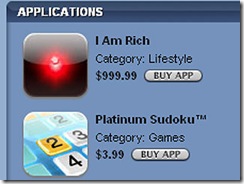Aug 11

Apple pulled the plug on a controversial application sold in its new iTunes App Store. Last Thursday, Apple removed the $999.99 “I Am Rich” application created by developer Armin Heinrich. Apparently eight idiots with nothing better to do with their money had purchased the “glorified screensaver” before it was removed from sale.
The “I am Rich” application displays a glowing red gem on the iPhone screen for the sole purpose of proving that the iPhone’s owner is either rich or stupid or probably both. That’s literally all it does. Here is the product’s official description: “The red icon on your iPhone or iPod Touch always reminds you (and others when you show it to them) that you were able to afford this. It’s a work of art with no hidden function at all.”
Continue reading »
Aug 08
In a ruling that’s likely to send shock waves throughout the technology industry, the California Supreme Court upheld a 136-year-old state law against non-compete clauses in employment contracts. The ruling says that employers cannot restrict employees from working for a competitor or soliciting former clients once they leave the company.
Continue reading »
Aug 07
Beerware is software that is released under a very liberal license. The Beerware license provides the end user with the right to use a software program and its source code for any purpose. Should the user ever meet the program’s author, the user is encouraged to buy the author a beer.
The term was invented by John Bristor in 1987. Many variations have been implemented, including the short and sweet Beerware license by Poul-Henning Kamp:
/*
* ----------------------------------------------------------------------------
* "THE BEER-WARE LICENSE" (Revision 42):
* <phk@FreeBSD.ORG> wrote this file. As long as you retain this notice you
* can do whatever you want with this stuff. If we meet some day, and you think
* this stuff is worth it, you can buy me a beer in return Poul-Henning Kamp
* ----------------------------------------------------------------------------
*/
Source: Wikipedia
Jul 29
No surprise given the sluggish economy, but venture capital (VC) funding for U.S. startup companies remained flat in the second quarter. According to PricewaterhouseCoopers (PWC), venture capitalists invested $7.4 billion in 990 deals.
Continue reading »
Jul 22
If you’re one of thousands of Simpsons fans who added ChunkyLover53 as an AOL Instant Messenger buddy, your computer may be at risk from a Turkish botnet.
Continue reading »
Jul 17
A creed is a statement of belief or faith often recited as part of a religious service or organizational gathering. The word “creed” derives from the Latin credo (I believe) or credimus (we believe). Perhaps the oldest is Apostle’s Creed cited in Christianity. However, the Rifleman’s Creed is arguably the most famous, made popular by the Stanley Kubrick war movie “Full Metal Jacket” (warning: language). This has inspired me (with tongue planted firmly in cheek) to write a creed for our noble profession of software development.
Continue reading »
Jul 16
A disgruntled computer engineer working for the City of San Francisco apparently seized control of a new multimillion-dollar computer system. Police arrested Terry Childs, 43, on four charges of computer tampering. Authorities say Childs hacked the city’s new FiberWAN (Wide Area Network), which stores official emails, payroll records, confidential law enforcement documents, and jail bookings. Childs locked the entire system and created a password that gives him exclusive access.
Continue reading »
Jul 15
In the “old days” of typewriters, forensic scientists could match a ransom note to the typewriter that produced it to apprehend the kidnappers. This was possible because microscopic differences in the metal letters produced a “typographical fingerprint” that could be identified from any page printed on that typewriter.
As a result, it became fashionable to produce ransom notes with disparate letters cut from a magazine, such as:

Today, computer printers are highly precise instruments that make it nearly impossible to distinguish between pages printed on the same brand printer. However, an article in USA Today describes how many color laser printers leave microscopic yellow dots on each printed page to identify the printer’s serial number and ultimately, you.
Continue reading »
Tags: Color Laser Printers, Yellow Dots
Jul 10
The millionaire founder of an Internet software security company has gone missing in Hawaii following months of bizarre behavior. Steven Thomas, 36, was last seen June 30 at a Waikiki hotel.
Thomas and ex-girlfiend Kirsten Talley founded Webroot Software in Boulder, Colorado in 1997. Thomas wrote Spy Sweeper and Window Washer programs. The pair sold their stake for $108 million to venture capitalists in December 2004. They split the proceeds and parted ways. Thomas then moved to O’ahu, where he bought a beachfront home. His net worth is estimated to be around $50 million.
Continue reading »
Jul 09
 This is part 3 in a series of articles on obscure programming languages.
This is part 3 in a series of articles on obscure programming languages.
The Cyclone programming language is a safe dialect of C. Pure Cyclone programs are not vulnerable to a wide class of bugs that plague C programs: buffer overflows, format string attacks, double free bugs, dangling pointer accesses, etc.
Continue reading »


 This is part 3 in a
This is part 3 in a